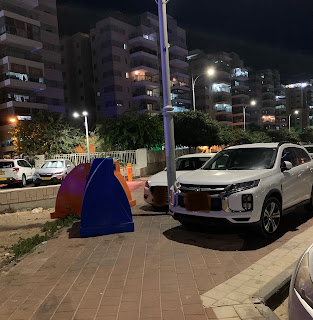In
these modern times, we have kosher for Shabbat electric scooters/wheelchairs
and Shabbat elevators, both which allow those with physical disabilities to
attend synagogue on Shabbat and Chaggim (holidays), as well as visit
friends and family, while feeling as independent members of the community.
However,
all this is worthless if the path is not clear.
In
many cities across Israel, all day long on Shabbat and Chag, cars are
parked, blocking sidewalk access to those using wheelchairs, walkers, or even baby
carriages. This also occurs every week-day evening as commuters return home.
It seems to be part of the
car culture in Israel for drivers not to think or care what impact their
actions might have on someone else. Unfortunately, this is a continuation of my
previous discussion on “How to Fix Israeli Drivers” (The Jerusalem Post, September 4, 2021). A good part of the fault
lies with the individual city governments and their zoning commissions. Each
city is at fault for not enforcing existing parking regulations. The local zoning
commissions are at fault for not creating laws for the proper ratio of
apartments to parking spots to be required by residential builders (kablanim).
[Commercial builders also need to provide the proper number of parking spots,
space to maneuver in the parking lot, and out of the way loading docks for stores
in malls, which also must be mandated in zoning regulations.]
So, how do we motivate the
cities to act on behalf of creating a better quality of life for all its
citizens? Perhaps, the city of Portland, Oregon on the west coast of the United
States has the answer.
A lawsuit was filed by
people with disabilities who say they cannot navigate their city streets
because of tents filled with the homeless who block the sidewalks. According to
Claire Rush of the Associated Press in a September 8, 2022 article appearing in
Huffington Post “The
class action suit seeks to require the city to clear all sidewalks of tent
encampments and debris, and to ‘construct, purchase, or otherwise provide for
emergency shelters in which to house the unsheltered persons’ who may be
affected.” [Just web search the
phrase “disabilities org sues Portland” to see articles, pictures, and videos.]
Instead of tents blocking pedestrian
access, here in Israel we have illegally parked vehicles blocking normal, sidewalk
access.
This next Shabbat or Chag,
regardless of your religiosity, take a short walk around your neighborhood. Try
to imagine yourself in a wheelchair or pushing a baby carriage with a few small
children tagging along. Are any of the curb cut-outs (ramps) or entire sidewalks
blocked by a vehicle? And then you will realize that it might mean going around
the vehicles and perhaps into the street with traffic or have to turnaround to
go another way.
How does that make you feel?
Why not use the same tactic
as Portland, Oregon? There are number of Israeli organizations focused on the
handicapped. Since our city governments are not being sensitive to the needs of
the physically handicapped and young families with baby carriages, as well as
ordinary citizens, why not sue the cities on behalf of those with disabilities
to ticket and remove those vehicles blocking sidewalks and walkways? It might
be worth a try.
# # #



Comments
Post a Comment